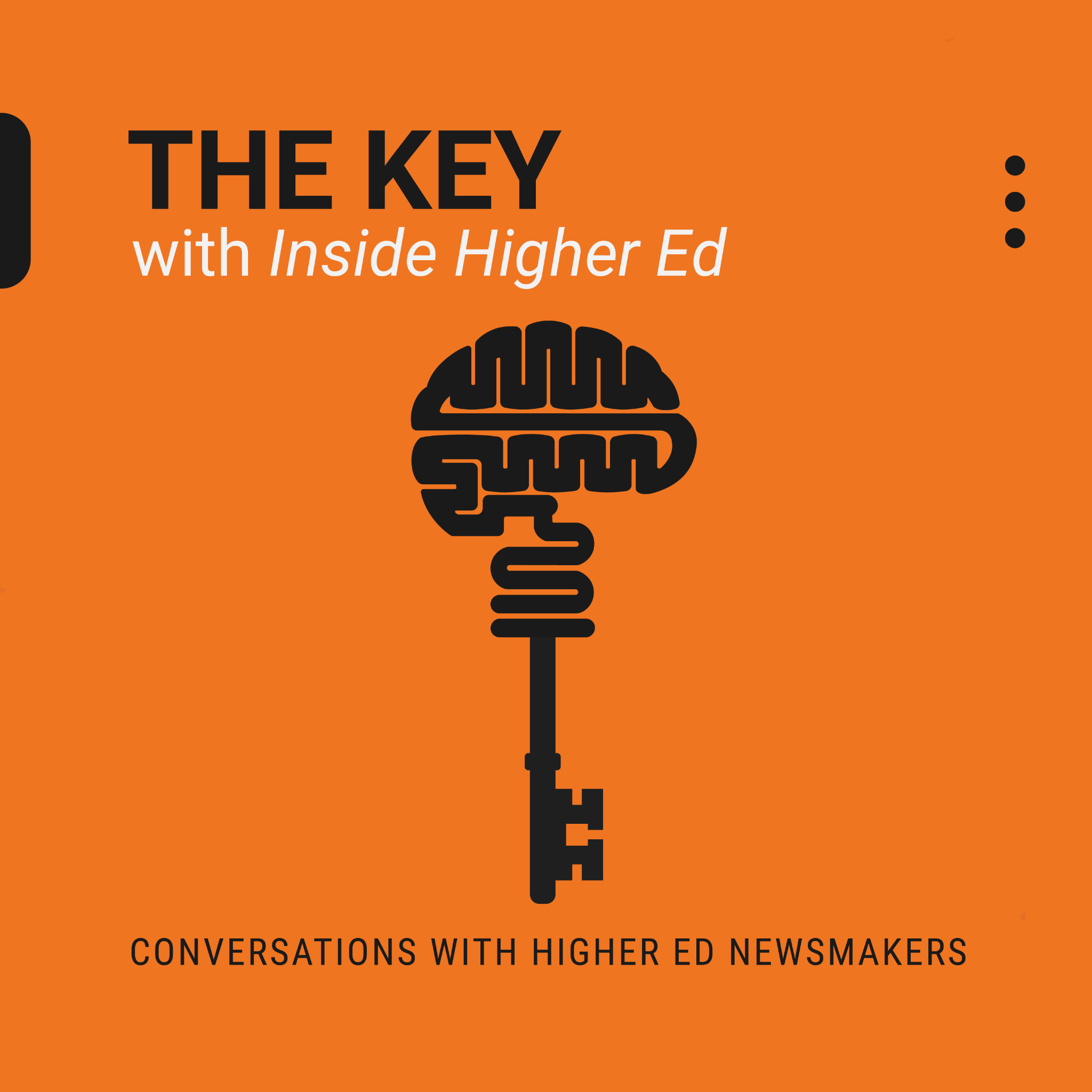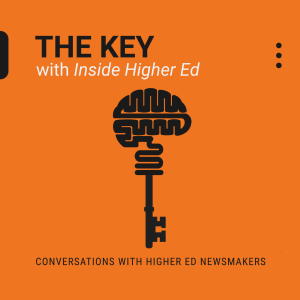
Hear candid conversations with higher-ed newsmakers. Hosted by Inside Higher Ed. Inside Higher Ed is the leading source for the latest news, analysis, and services for the entire US higher education community.
Hear candid conversations with higher-ed newsmakers. Hosted by Inside Higher Ed. Inside Higher Ed is the leading source for the latest news, analysis, and services for the entire US higher education community.
Episodes

Tuesday Sep 12, 2023
Ep. 98: Streamlining and Scaling Transfer for Equity’s Sake
Tuesday Sep 12, 2023
Tuesday Sep 12, 2023
The complex, confusing process by which students move between colleges has been an acknowledged barrier impeding postsecondary completion, particularly for underrepresented students. The issue is drawing increasing attention from policy makers, given rising concerns about value and equity.
This week’s episode of The Key looks at some of the transfer work being done by the major college and university systems that enroll a majority of today’s learners. Two experts participate in the discussion.
Dan Knox is director of the Institute for Systems Innovation and Improvement at the National Association of System Heads, known as NASH, which is undertaking various efforts to align the work of state systems on attacking this problem. Rebecca Karoff is associate vice chancellor for academic affairs at the University of Texas System, where she oversees a transfer advisory group and works with other systems in the state on these issues.
The Key is hosted by Inside Higher Ed Co-founder and Editor Doug Lederman. This episode is sponsored by the Bill & Melinda Gates Foundation.

Monday Aug 21, 2023
Monday Aug 21, 2023
The Key continues to share Inside Higher Ed’s latest collaboration with Times Higher Education – Campus Podcast. Eve Riskin, dean of undergraduate education at Stevens Institute of Technology, talks about the power of mentorship, diversity in excellence and what she, as an electrical engineer and computer scientist, thinks about the emergence of generative AI.
Episode sponsored by Stevens Institute of Technology.

Monday Jul 24, 2023
Monday Jul 24, 2023
The Key shares Inside Higher Ed’s latest collaboration with Times Higher Education – Campus Podcast. This interview features Montclair State University President Jonathan Koppell as he discusses how universities can be more proactive in rebuilding public trust in higher education. It’s tied to accessibility and degree completion, he argues, and universities need to acknowledge their failures in meeting those objectives. Meanwhile, service learning and supporting minoritized groups are central to Dr. Koppell’s institutional strategy. And with many institutions in the US facing financial difficulties, he discusses his decision to merge Bloomfield College into the Montclair system.

Thursday May 25, 2023
Ep. 97:Promoting Student Well-Being in Today’s Learning Environments
Thursday May 25, 2023
Thursday May 25, 2023
This week’s episode of The Key, Inside Higher Ed’s news and analysis podcast, builds off a great conversation that took place earlier this month at Digital Universities U.S., an event Inside Higher Ed co-hosted in Chicago with our partners from Times Higher Education. The conversation featured leaders from three very different institutions talking about how their institutions create online or blended educational experiences that build a sense of community and belonging for students, prepare faculty and staff members to respond to learners’ social and psychological needs as well as academic ones, and use data effectively.
Joining the discussion were Sarah Dysart, senior director of online learning at the University of Michigan at Ann Arbor; Omid Fotuhi, director of learning innovation at WGU Labs; and Jeremy Alexis, vice provost in the office of professional and continuing education at Illinois Institute of Technology. Times Higher Education’s Charlotte Coles moderated the conversation.
Hosted by Inside Higher Ed Editor Doug Lederman. This episode is sponsored by The Bill & Melinda Gates Foundation.

Wednesday May 10, 2023
Ep. 96: Creating Higher Ed Experiences That Transform Lives
Wednesday May 10, 2023
Wednesday May 10, 2023
As public support belief in the value of higher education has steadily declined in recent years, most of the attention for turning that around has been on improving the career readiness of graduates and making college more affordable.
But an emergent group of college leaders believes the real key may be to ensure that all learners, regardless of background, have experiences in college that help them develop identity, agency and purpose with the goal of improving their well-being 30 years down the road.
This episode of The Key features a conversation with Richard K. Miller, president emeritus of Olin College of Engineering and a driving force behind the Coalition for Life Transformative Education. In our interview, he discusses how the coalition’s diverse group of members are using data-informed experiments to rework their curriculums and scale the use of project-based experiences to build a sense of belonging and a growth mindset for all of their students.
Hosted by Inside Higher Ed Editor Doug Lederman. This episode is sponsored by The Bill & Melinda Gates Foundation.

Tuesday Apr 25, 2023
Ep. 95: Redefining ‘Mental Health’ for Today’s College Students
Tuesday Apr 25, 2023
Tuesday Apr 25, 2023
Are we in the midst of a mental health “crisis” for college students and other young people? How should campus administrators and faculty members be thinking about the mental health of their students and their roles in addressing it? And do we perhaps need to reframe the discussion around what “mental health” even is?
This week’s episode of The Key explores an issue that has been at or near the top of the worry list for those who work in and around higher education, as learners report record levels of depression, anxiety and other conditions; strain campus counseling and health centers seeking treatment; and struggle academically, sometimes to the point of stopping out altogether.
Joining the discussion are Lisa Damour, a psychologist and author of The Emotional Lives of Teenagers, Nance Roy, chief clinical officer at the Jed Foundation; and R. Ryan Patel, senior staff psychiatrist at Ohio State University and chair of the mental health section of the American College Health Association.
This episode is sponsored by The Bill & Melinda Gates Foundation. Hosted by Inside Higher Ed Editor Doug Lederman.

Wednesday Mar 22, 2023
Ep. 94: Higher Ed’s Longtime Chief Lobbyist, Unplugged
Wednesday Mar 22, 2023
Wednesday Mar 22, 2023
Terry Hartle retired last fall after 30 years as the chief government and public affairs officer at the American Council on Education, where he had a front-row seat to virtually every important higher education policy discussion. In this week’s episode of The Key, Hartle talks about the partisanship and inertia that afflicts today’s politics, politicians’ increased questioning and oversight of higher education, and the implications for colleges, their employees, and their students.
Hosted by Inside Higher Ed's Editor and Co-Founder Doug Lederman

Wednesday Feb 08, 2023
Ep. 93: Is For-Profit Higher Education on Its Last Legs?
Wednesday Feb 08, 2023
Wednesday Feb 08, 2023
Does the possible sale of the University of Phoenix to a public university system signal the demise of the for-profit higher education sector that Phoenix once epitomized?
This week’s episode of The Key analyzes the implications of recent news that a nonprofit affiliated with the University of Arkansas System might buy the former giant among for-profit colleges. Joining the discussion are Kevin Kinser, who heads the department of Education Policy Studies at Pennsylvania State University; Julie Peller, executive director of the nonprofit Higher Learning Advocates and a longtime expert on federal higher ed policy; and Paul Fain, who edits a weekly newsletter called The Job and a former editor of Inside Higher Ed.
The episode focuses less on the possible sale of Phoenix -- about which details remain sketchy -- than on the overall state of for-profit institutions, the changing definition of “for-profit” in higher education, and how to regulate the increasingly blurry landscape of postsecondary education and training.
Hosted by Inside Higher Ed Editor Doug Lederman.

Wednesday Oct 26, 2022
Ep. 92: Looking Back at DIY U and Ahead, With Anya Kamenetz
Wednesday Oct 26, 2022
Wednesday Oct 26, 2022
In 2010, a book called DIY U: Edupunks, Edupreneurs and the Coming Transformation of Higher Education envisioned a wholesale shift in how people learned. More than a decade later, how has that panned out?
This week’s episode features a conversation with Anya Kamenetz, the author and journalist who in 2010 tapped into an emerging set of issues around student debt, rapid technological change and political upheaval to lay out a portrait of a world in which individuals could learn when and how they wanted and be far less dependent on instructors and institutions.
She discusses the current landscape and what she got right and wrong 12 years ago.
Hosted by Inside Higher Ed Editor Doug Lederman.
This episode is sponsored by Kaplan.

Thursday Oct 20, 2022
Ep. 91: The Pros and Cons of HyFlex Instruction
Thursday Oct 20, 2022
Thursday Oct 20, 2022
During the pandemic, many colleges and universities embraced a form of blended learning called HyFlex, to mixed reviews. Is it likely to be part of colleges’ instructional strategy going forward?
This week’s episode of The Key explores HyFlex, in which students in a classroom learn synchronously alongside a cohort of peers studying remotely. HyFlex moved from a fringe phenomenon to the mainstream during the COVID-19 pandemic, and the experience was imperfect at best, for professors and students alike.
This conversation about the teaching modality features two professors who have both taught in the HyFlex format and done research on its impact. Enilda Romero-Hall is an associate professor in the learning, design and technology program at the University of Tennessee at Knoxville who got her doctorate in a HyFlex program and taught using it pre-pandemic. Alanna Gillis, an assistant professor of sociology at St Lawrence University, had her first Hyflex experiences during COVID-19.
Hosted by Inside Higher Ed Editor Doug Lederman.
Episode sponsored by Kaplan.
